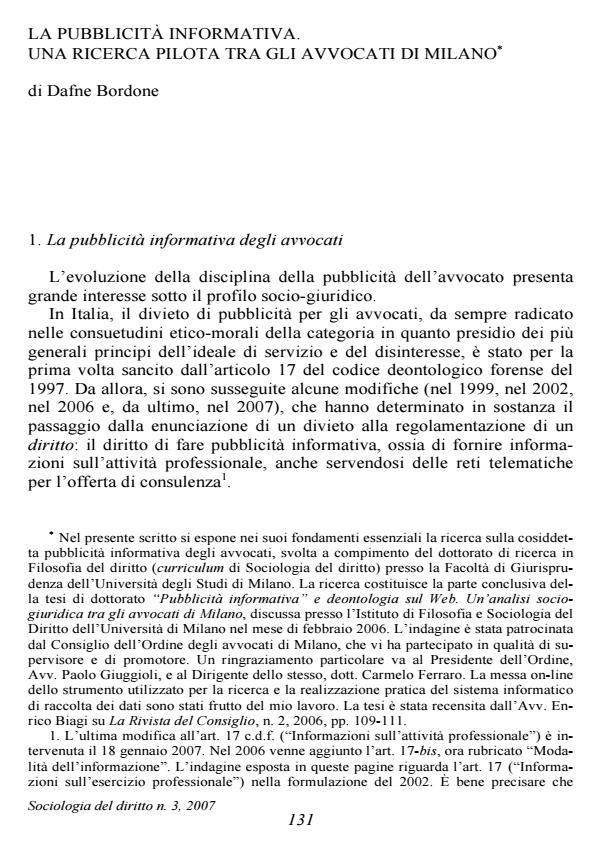La pubblicità informativa. Una ricerca pilota tra gli avvocati di Milano
Titolo Rivista SOCIOLOGIA DEL DIRITTO
Autori/Curatori Dafne Bordone
Anno di pubblicazione 2008 Fascicolo 2007/3 Lingua Italiano
Numero pagine 30 P. 131-160 Dimensione file 270 KB
DOI
Il DOI è il codice a barre della proprietà intellettuale: per saperne di più
clicca qui
Qui sotto puoi vedere in anteprima la prima pagina di questo articolo.
Se questo articolo ti interessa, lo puoi acquistare (e scaricare in formato pdf) seguendo le facili indicazioni per acquistare il download credit. Acquista Download Credits per scaricare questo Articolo in formato PDF

FrancoAngeli è membro della Publishers International Linking Association, Inc (PILA)associazione indipendente e non profit per facilitare (attraverso i servizi tecnologici implementati da CrossRef.org) l’accesso degli studiosi ai contenuti digitali nelle pubblicazioni professionali e scientifiche
This article presents the results of a pilot study conducted among Milanese attorneys, whose purpose was to investigate the phenomenon of informative advertising, as sanctioned by Article 17 of the legal profession’s code of conduct after the reforms introduced in 1999. The recognition of the legal value of such information advertising, whose contents and purpose differentiate it from unadorned commercial advertising, was propounded forcefully by several sectors of the legal community, who stressed the urgency of reviewing the prohibition of advertising in the light of the evolution of the socio-economic context, of its fallout on the practice of the professions and of the increasing contacts and exchanges of experiences with foreign practitioners. The evolution of the discipline governing attorney advertising, from the original text of Article 17, dated 1997, to its latest amendment in 2007, is of considerable interest from a socio-legal standpoint, as it has gradually brought about the acceptance (though not without bitter debate and recrimination), on the part of the professional community, of liberal principles that nevertheless remain subordinate to the prestige of the attorney’s profession and to the relationship of trust on which it is based. The aim pursued by this survey was to apply previously selected parameters and a strict technique of investigation sending a questionnaire via e-mailboth to determine what the interviewees think about the possibility of using informative advertising and to describe whether and how Milan’s law offices make use of online consultancy and exploit the opportunity to provide information about the work they do, also via the Internet. In the process, special attention was paid to certain aspects intrinsic to providing services via IT systems, including compliance with the professional principles of secrecy and privacy.;
Dafne Bordone, La pubblicità informativa. Una ricerca pilota tra gli avvocati di Milano in "SOCIOLOGIA DEL DIRITTO " 3/2007, pp 131-160, DOI: